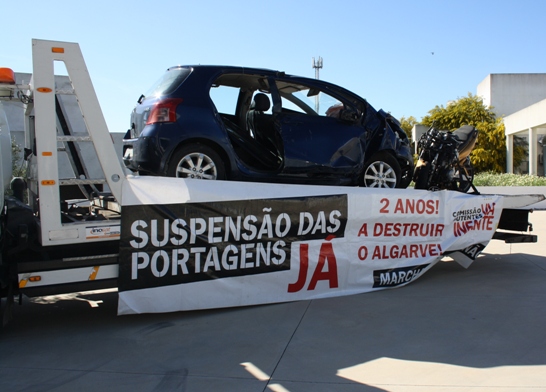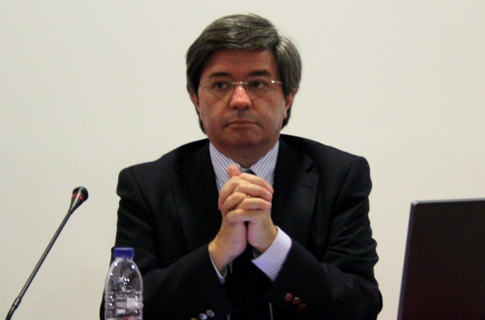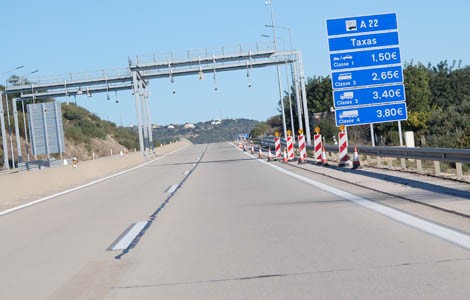 A platform transversal to the Algarve society will be created, which will require the immediate suspension of toll collection on Via do Infante, led by AMAL-Community Intermunicipal do Algarve and which will bring together public entities, business and civil associations.
A platform transversal to the Algarve society will be created, which will require the immediate suspension of toll collection on Via do Infante, led by AMAL-Community Intermunicipal do Algarve and which will bring together public entities, business and civil associations.
The first meeting of this structure is yet to be scheduled but, for now, it was clear the "no to tolls" on the part of the many representatives of the region's living forces, businessmen from neighboring Andalusia and citizens who participated in the II "Forum Algarve/Andalusia" , which took place this Saturday in Loulé.
A measure that the Commission of Users of Via do Infante, which organized the event in partnership with the Municipality of Loulé, considers as an advance in the fight against the collection of fees on the A22, which has been carried out with great intensity (but not always with a lot of adhesion) in the last two years.
“We have always defended that there should be a consensus as broad as possible, which goes beyond the party's political orientations,” said João Vasconcelos, a member of CUVI and councilor of the Portimão Chamber for the Left Bloc. CUVI has always functioned in that register, he assured, since it has members "from all parties, from BE to CDS/PP", in addition to others without party affiliation.
 It was João Vasconcelos who challenged AMAL president Jorge Botelho to be the face of this struggle, from now on, and lead the process of creating the platform. A challenge accepted by the Tavirense mayor, who did not hide the fact that, in his view, there is no place for tolls on Via do Infante.
It was João Vasconcelos who challenged AMAL president Jorge Botelho to be the face of this struggle, from now on, and lead the process of creating the platform. A challenge accepted by the Tavirense mayor, who did not hide the fact that, in his view, there is no place for tolls on Via do Infante.
“After a very wide debate, there are two conclusions that we can draw. First: the process is not against anyone, but in favor of the suspension or abolition of tolls on Via do Infante and the upgrading of EN 125. Second note: this is not a matter of political-partisan or private interests, it is in favor of Algarve», stressed Jorge Botelho.
"We, as mayors, believe that this process will have to be resumed, because the assessment of the introduction of tolls in Via do Infante is proving to be a disaster, both economic and for mobility, with disastrous prospects for the tourism sector and for cross-border trade», considered the AMAL president, on the sidelines of the session.
During his speech, as a member of the board of this Forum, Jorge Botelho had already defended that «what the Government did was a betrayal of the Algarve», for having placed tolls on the A22, when he had assured the region's mayors that this would only happen after EN 125 to be upgraded.
 AMAL and the Algarve Tourism Region were two of the entities present and that had already been in a first meeting between entities on both sides of the border, but this time there was a very significant participation.
AMAL and the Algarve Tourism Region were two of the entities present and that had already been in a first meeting between entities on both sides of the border, but this time there was a very significant participation.
In addition to many mayors, the vast majority of the PS, but also Francisco Amaral, of the PSD, it was noted the presence of deputies to the Assembly of the Republic Cecília Honório (BE) and Miguel Freitas (PS) and representatives of business associations, namely Vítor Grandson of the Algarve Region Entrepreneurs Association, whose facilities hosted the event, and Armando Santana, of the Algarve Rent-a-Car Companies Association.
Former dean of the University of Algarve Adriano Pimpão, former mayor of the Chamber of Faro José Vitorino and, of course, the guest of honor, vice president of Associação Transparência e Integridade Paulo de Morais were also present and contributed to the debate.
Despite the different styles, the view on toll collection on Via do Infante and the consequences this has for the Algarve deserved consensus. The demand for its suspension (many also asked for its permanent abolition) was also defended by all those involved and made official in a manifesto read by the mayor of Loulé Vítor Aleixo at the end of the meeting and which was given to sign by those present.
It defends the arguments that have been used over the past two years, by various interveners, who are immediately involved in the losses that Via do Infante continues to give the Government, despite the tolls, which, in the third quarter 2013 amounted to more than €21 million. The increase in insecurity on the EN 125 and the disastrous effects for the tourism sector and for the attraction of the Spanish and Andalusian proximity market, are other arguments presented.
Via do Infante is a « ruinous PPP » and it is not the only one
 Paulo de Morais' intervention, as it turned out to be at the stage when the public was invited to participate, was one of the most anticipated of the afternoon and was one of the factors that helped to fill NERA's auditorium. The vice-president of the Transparency and Integrity Association made a presentation, to say the least, disturbing, on the contours of Public-Private Partnerships on highways, which continue, in many cases, to be involved in great secrecy.
Paulo de Morais' intervention, as it turned out to be at the stage when the public was invited to participate, was one of the most anticipated of the afternoon and was one of the factors that helped to fill NERA's auditorium. The vice-president of the Transparency and Integrity Association made a presentation, to say the least, disturbing, on the contours of Public-Private Partnerships on highways, which continue, in many cases, to be involved in great secrecy.
No wonder, taking into account the figures presented by Paulo de Morais, which indicate, from the outset, a bad deal for the public purse, which will cost the state coffers, in 2014, something like «4 billion euros» and will continue to have an enormous weight in public accounts over the next 20 years.
Via do Infante is just another case, and it is not even the most serious. The annual cost for the State is 40 million and, for Paulo de Morais, the solution was quite simple. “If they gave the banks 1/400th less than what they gave, they would have the 40 million needed to pay the Via do Infante”, he defended.
On the other hand, he argues, by placing tolls on the former SCUT, the Government motivated a reduction in traffic – which reached 50 percent on the A22 – and led to a reduction in fuel consumption. "Given that half of what is paid for a liter of fuel is taxed, the Government lost, in 2012, much more money in Tax on Petroleum Products than what it earned in tolls", he assured.
Charging for the gantries system also represents an expense that, in the Algarve, reaches 29 percent of the amount charged to the citizen, reaching half of it in other parts of the country. "It's as if, in a hotel, half of the bill's value was the cost of the invoice," he exemplified.
 Paulo de Morais' intervention was very focused on PPP roads and the alleged corruption they motivate. The figures presented are «all real» and taken from the limited documentation available, since information about the PPP road business «is constantly withheld».
Paulo de Morais' intervention was very focused on PPP roads and the alleged corruption they motivate. The figures presented are «all real» and taken from the limited documentation available, since information about the PPP road business «is constantly withheld».
Data that indicate that the Portuguese State pays inadequate rents and well above the cost of the service and that the contracts include clauses that remove all the risk from the private sector business and place it exclusively on the side of the public sector. Something that is far from being a novelty, but that the Transparency and Integrity Association makes a point of remembering.
What will not be common knowledge is that there will be several solutions to end this situation, although, so far, the Government has only “renegotiated PPP whose works have not yet started or are in the beginning”. The most expensive deals remain intact, but it doesn't have to be that way.
Paulo de Morais suggests, from the outset, that the concessionaires be proposed to drastically reduce rents. "If they are offered half of what they earn now, they will accept it anyway and continue to make a profit," he assured.
And why would anyone accept receiving half when they can receive everything? Because, said Paulo de Morais, the State has more aggressive instruments at its disposal and may even have an advantage in using them, in some cases. “If the Vasco da Gama Bridge concession were expropriated for its value, the State would not have to pay anything and maybe even received some money from Lusoponte, because the work is more than paid for”, he assured.
 Another possibility is, simply, to denounce the contracts, because, according to the anti-corruption activist, they are hurt by illegality, for several reasons.
Another possibility is, simply, to denounce the contracts, because, according to the anti-corruption activist, they are hurt by illegality, for several reasons.
An intervention that generated strong reactions from the audience, including one from the mayor of Olhão António Pina, at least unexpected. «I was here listening to Dr. Paulo Morais and thinking about something and whether to say it or not…». And he said: "There are some bastards who are stealing from us!"
António Pina asked Paulo de Morais to summarize the denunciation he made in Loulé in a concise text and undertook to "send this letter along with the water bill to the citizens" of Olhão. "Look, they don't pay like that anymore," joked the vice president of the Transparency and Integrity Association.


















Comments